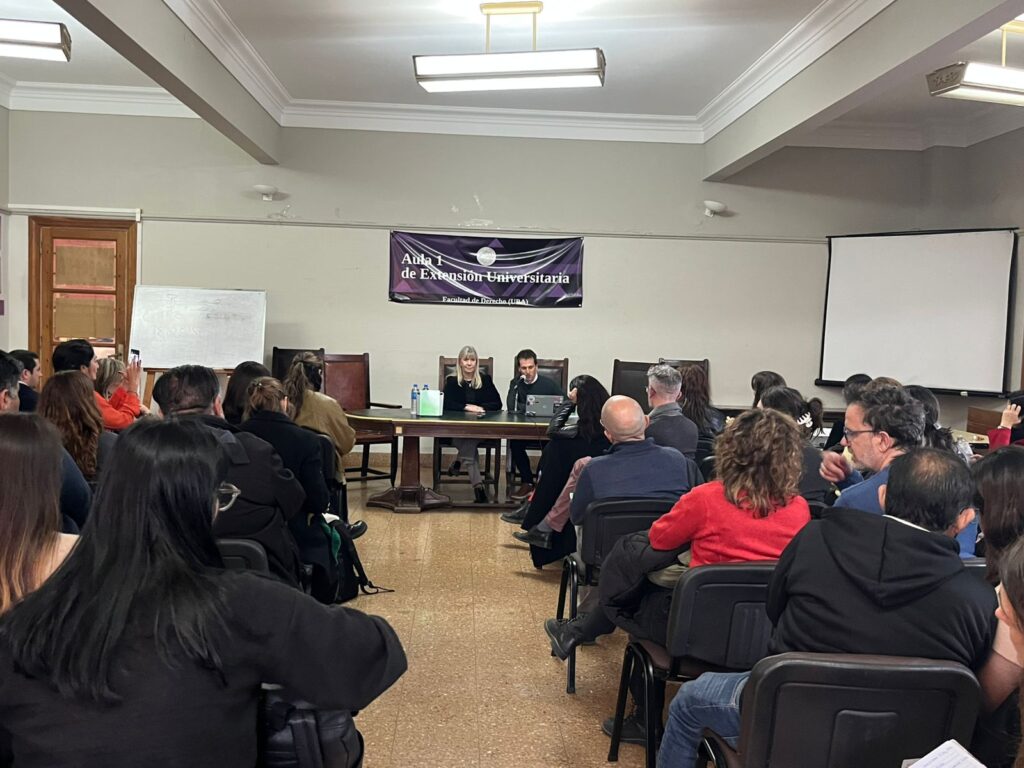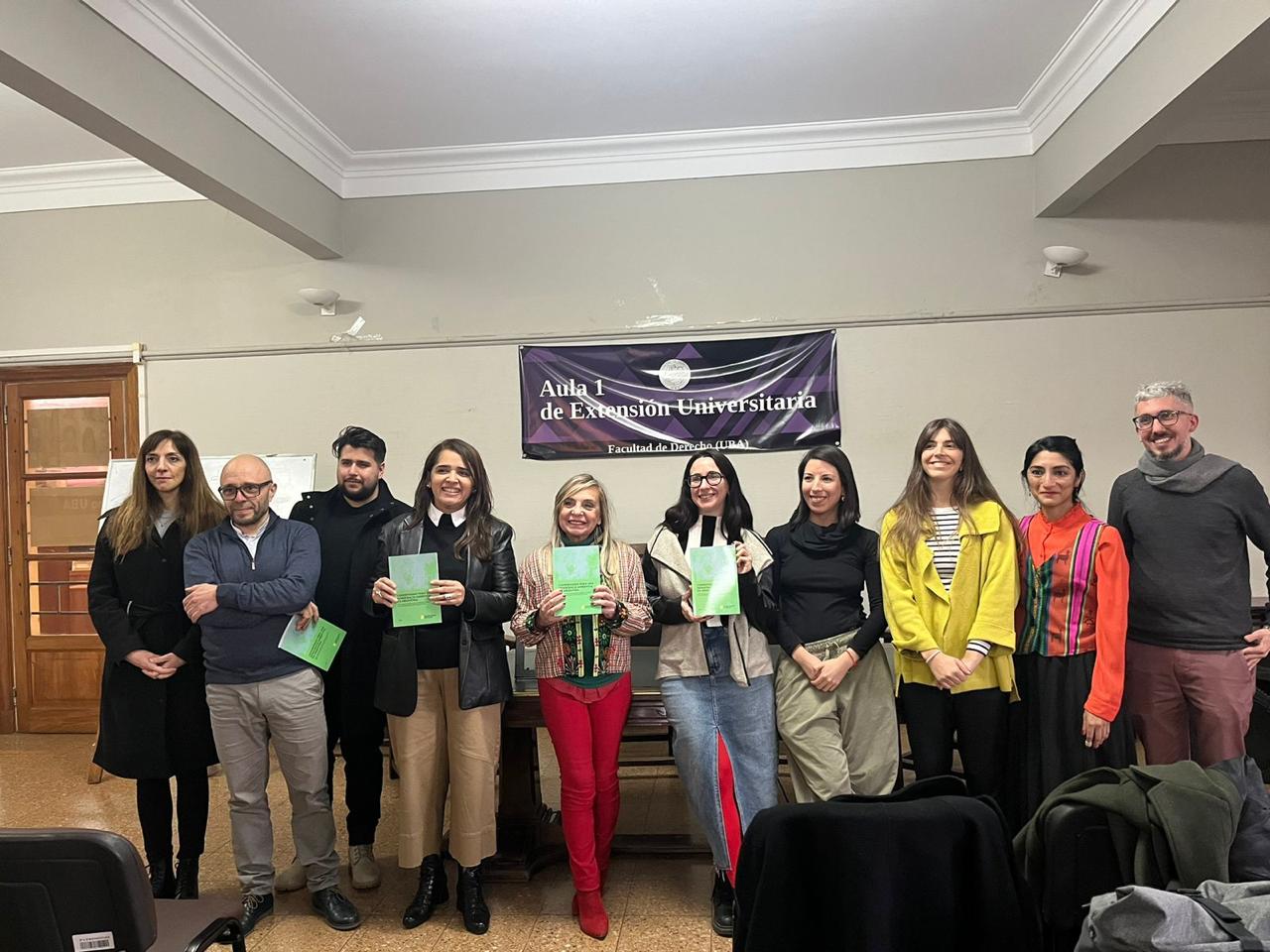Environmental, human rights, and academic organizations presented the first report of the Environmental and Climate Observatory for the Implementation of the Escazú Agreement this August, during an event held at the Faculty of Law of the University of Buenos Aires (UBA).
The Environmental and Climate Observatory for the Implementation of the Escazú Agreement in Argentina brings together civil society organizations, academia and defenders working on the ground to harness synergies in monitoring the implementation of the Escazú Agreement —ratified by Argentina through Law 27.566 in 2021— and to promote its effective and comprehensive enforcement. Since late 2023, the country has had a National Implementation Plan but there has been little progress in its application.
“This first report serves as a starting point for discussing new lines of action to urge authorities to fully and effectively implement both the Agreement and its plan. This is essential to strengthen environmental democracy, especially in the territories, and to ensure the safety of environmental defenders so that they can do their work,” said Cristian Fernández, Legal Coordinator at Fundación Ambiente y Recursos Naturales (FARN), an Argentine based environmental NGO.
The report, titled Coordinates for Environmental Democracy in Argentina, is composed of eight chapters focusing on: setbacks to the principle of non-regression in the country; the quality of access to public information; the level of public participation in hearings and consultations; barriers to environmental justice; and current and potential threats faced by environmental human rights defenders across various provinces. It also incorporates a gender perspective in monitoring the Agreement’s implementation.
The Environmental and Climate Observatory for the Implementation of the Escazú Agreement in Argentina is a result of the joint efforts of: the Environment and Natural Resources Foundation (FARN), Center for Legal and Social Studies (CELS), Amnesty International Argentina, Center for Public Policies for Socialism (CEPPAS), CAUCE Foundation: Environmental Culture – Ecologist Cause, Foundation for the Development of Sustainable Policies (FUNDEPS), Sustainability Without Borders, Environmental Law Center of the UBA Faculty of Law (CeDAF-UBA), Citizen Association for Human Rights (ACDH), Argentine Association of Environmental Lawyers (AAdeAA), Consciente Colectivo, Meulen Project at the National University of the Littoral (UNL), Peace and Justice Service (SERPAJ), New Generation Argentina Foundation, Plurales Foundation, and the University of Salta.

—————————————————————————————————————————————
Florencia Gómez, Director of Institutional Relations at the Center for Public Policies for Socialism (CEPPAS):
“The value of this first report lies in its collective nature. Different organizations and individuals coming together, each contributing their expertise and writing about what they know best. This book is a meeting of knowledge. Today, we witness a new form of destruction every single day. In this context, to speak of building is an act of tremendous courage.”
Betania González, Environmental Management graduate from the Center for Public Policies for Socialism (CEPPAS):
“Today, there is an institutional failure in ensuring free, prior, and informed participation. Escazú sets out guidelines to improve access to information for Indigenous and local communities, and to ensure that participation is equitable and non-hierarchical. However, there is a significant lack of state oversight and enforcement.”
Delfina Vila Moret, from the Environmental Law Center (CeDAF-UBA):
“Who are environmental human rights defenders? We’re trying to shed light on this question. It’s necessary to have a clear definition. Having a shared understanding helps build stronger institutional frameworks. We hope this report serves as a useful tool for everyone working in environmental defense.”
Bárbara Juárez, lawyer with the Democratic Security and Institutional Violence team at the Center for Legal and Social Studies (CELS):
“In Argentina, territorial defenders face threats, criminalization, persecution, and harassment — from both state and non-state actors. The national government has institutionalized repression and criminalization, and promoted reforms that benefit extractive industries. Security forces are now serving private interests. This political stance heightens the risks faced by environmental defenders.”
Lisandro Vázquez Giménez, legal advisor at the Environment and Natural Resources Foundation (FARN):
“At the national level, the Remote Procedures (TAD) system has flaws, but compared to the provincial level, it’s more accessible — it doesn’t require in-person visits like in some provinces and municipalities. In environmental matters, the information system is outdated, and this represents a barrier to access to information.”
Andrés Nápoli, Executive Director of the Environment and Natural Resources Foundation (FARN):
“This Observatory is unprecedented in the region. The Escazú Agreement is for the people. It’s a tool that we must use and deepen.”
Mijael Kaufman Falchuk, Co-founder of Consciente Colectivo (CoCo):
“We are in a difficult context. It’s important to bring the Escazú Agreement to places where people are still unaware of this international treaty — and to talk about why environmental issues matter.”
Ariel Genovese, environmental law specialist at the Center for Public Policies for Socialism (CEPPAS):
“We have a tradition of environmental lawsuits driven by individuals or civil society organizations. The Public Prosecutor’s Office should be the one safeguarding public interest. We need to ensure that environmental justice is no longer reserved only for major, high-profile cases. It’s time to take action — when everything else fails, what remains is the justice system.”
María José Lubertino, President of the Citizens’ Association for Human Rights (ACDH):
“When thinking about the pillars of Escazú, we must consider diversity and how impacts affect different groups. It is essential to present this book in various provinces and make an effort to understand environmental democracy in each of them within their specific contexts.”
